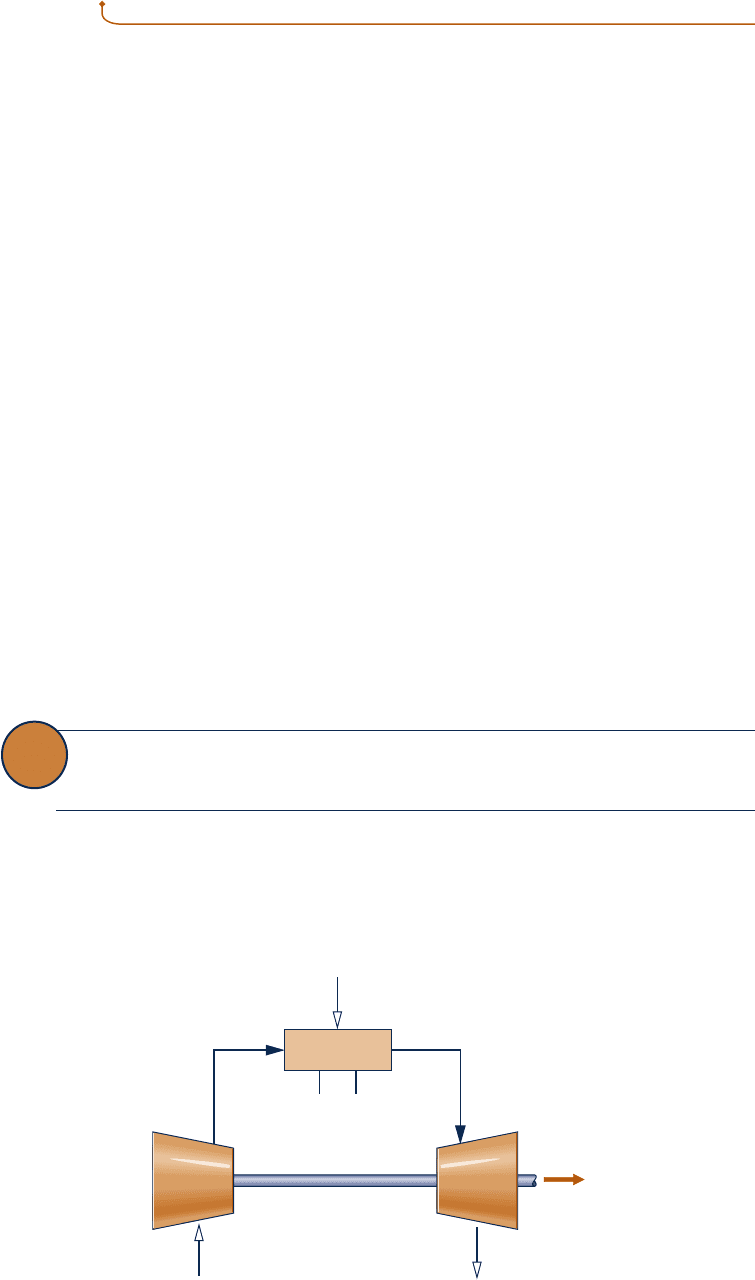Moran M.J., Shapiro H.N. Fundamentals of Engineering Thermodynamics
Подождите немного. Документ загружается.


13.3 Determining the Adiabatic Flame Temperature 803
which corresponds to Eq. 13.21b. Since the reactants enter at 25°C, the
1
¢h
2
i
terms on the right side vanish, and
the energy rate equation becomes
a
P
n
e
1¢h2
e
5
a
R
n
i
h8
fi
2
a
P
n
e
h8
fe
(2)
(a) For combustion of liquid octane with the theoretical amount of air, the chemical equation is
C
8
H
18
1l21 12.5O
2
1 47N
2
S
8CO
2
1 9H
2
O1g21 47N
2
Introducing the coefficients of this equation, Eq. (2) takes the form
81¢h2
CO
2
1 91¢h2
H
2
O1g2
1 471¢h2
N
2
5 31h8
f
2
C
8
H
18
1l2
1 12.51h8
f
2
O
2
0
1 471h8
f
2
N
2
4
0
2 381h8
f
2
CO
2
1 91h8
f
2
H
2
O1g2
1 471h8
f
2
N
2
4
0
The right side of the above equation can be evaluated with enthalpy of formation data from Table A-25,
giving
81¢h2
CO
2
1 91¢h2
H
2
O1g2
1 471¢h2
N
2
5 5,074,630 kJ
/
kmol 1fuel2
Each ¢
h
term on the left side of this equation depends on the temperature of the products,
T
P
. This temperature
can be determined by an iterative procedure.
The following table gives a summary of the iterative procedure for three trial values of T
P
. Since the summa-
tion of the enthalpies of the products equals 5,074,630 kJ/kmol, the actual value of T
P
is in the interval from
2350 to 2400 K. Interpolation between these temperatures gives T
P
5 2395 K.
T
P
2500 K 2400 K 2350 K
81¢h2
CO
2
975,408 926,304 901,816
91¢h2
H
2
O1g2
890,676 842,436 818,478
471¢h2
N
2
3,492,664 3,320,597 3,234,869
a
P
n
e
1¢h2
e
5,358,748 5,089,337 4,955,163
Alternative Solution:
The following IT code can be used as an alternative to iteration with table data, where hN2_R and hN2_P denote
the enthalpy of N
2
in the reactants and products, respectively, and so on. In the Units menu, select temperature
in K and amount of substance in moles.
TR 5 25 1 273.15 // K
// Evaluate reactant and product enthalpies, hR and hP, respectively
hR 5 hC8H18 1 12.5 * hO2_R 1 47 * hN2_R
hP 5 8 * hCO2_P 1 9 * hH2O_P 1 47 * hN2_P
hC8H18 5 2249910 // kj/kmol (value from Table A-25)
hO2_R 5 h_T("O2",TR)
hN2_R 5 h_T("N2",TR)
hCO2_P 5 h_T("CO2",TP)
hH2O_P 5 h_T("H2O",TP)
hN2_P 5 h_T("N2",TP)
// Energy balance
hP 5 hR
Using the Solve button, the result is TP 5 2394 K, which agrees closely with the result obtained above.
(b) For complete combustion of liquid octane with 400% theoretical air, the chemical equation is
C
8
H
18
1l21 50O
2
1 188N
2
S
8CO
2
1 9H
2
O1g21 37.5O
2
1 188N
2
c13ReactingMixturesandCombustio803 Page 803 7/13/10 11:41:11 AM user-s146 c13ReactingMixturesandCombustio803 Page 803 7/13/10 11:41:11 AM user-s146 /Users/user-s146/Desktop/Merry_X-Mas/New/Users/user-s146/Desktop/Merry_X-Mas/New

804 Chapter 13 Reacting Mixtures and Combustion
The energy rate balance, Eq. (2), reduces for this case to
81¢h2
CO
2
1 91¢h2
H
2
O1g2
1 37.51¢h2
O
2
1 1881¢h2
N
2
5 5,074,630 kJ
/
kmol 1fuel2
➊ Observe that the right side has the same value as in part (a). Proceeding
iteratively as above, the temperature of the products is T
P
5 962 K. The use
of IT to solve part (b) is left as an exercise.
➊ The temperature determined in part (b) is considerably lower than the value
found in part (a). This shows that once enough oxygen has been provided
for complete combustion, bringing in more air dilutes the combustion prod-
ucts, lowering their temperature.
Ability to…
❑
apply the control volume
energy balance to calculate
the adiabatic flame
temperature.
❑
evaluate enthalpy values
appropriately.
✓
Skills Developed
If octane gas entered instead of liquid octane, would the adiabatic
flame temperature increase, decrease, or stay the same? Ans. Increase.
13.3.3
Closing Comments
For a specified fuel and specified temperature and pressure of the reactants, the
maximum adiabatic flame temperature is for complete combustion with the theo-
retical amount of air. The measured value of the temperature of the combustion
products may be several hundred degrees below the calculated maximum adiabatic
flame temperature, however, for several reasons:
c Once adequate oxygen has been provided to permit complete combustion, bringing
in more air dilutes the combustion products, lowering their temperature.
c Incomplete combustion also tends to reduce the temperature of the products, and
combustion is seldom complete (see Sec. 14.4).
c Heat losses can be reduced but not altogether eliminated.
c As a result of the high temperatures achieved, some of the combustion products
may dissociate. Endothermic dissociation reactions lower the product tempera-
ture. The effect of dissociation on the adiabatic flame temperature is considered
in Sec. 14.4.
13.4 Fuel Cells
A fuel cell is an electrochemical device in which fuel and an oxidizer (normally oxy-
gen from air) undergo a chemical reaction, providing electrical current to an external
circuit and producing products. The fuel and oxidizer react catalytically in stages on
separate electrodes: the anode and the cathode. An electrolyte separating the two
electrodes allows passage of ions formed by reaction. Depending on the type of fuel
cell, the ions may be positively or negatively charged. Individual fuel cells are con-
nected in parallel or series to form fuel cell stacks to provide the desired level of
power output.
With today’s technology, the preferred fuel for oxidation at the fuel cell anode
is hydrogen because of its exceptional ability to produce electrons when suitable
catalysts are used, while producing no harmful emissions from the fuel cell itself.
Depending on the type of fuel cell, methanol (CH
3
OH) and carbon monoxide (CO)
can be oxidized at the anode in some applications, but often with performance
penalties.
fuel cell
c13ReactingMixturesandCombustio804 Page 804 7/13/10 11:41:13 AM user-s146 c13ReactingMixturesandCombustio804 Page 804 7/13/10 11:41:13 AM user-s146 /Users/user-s146/Desktop/Merry_X-Mas/New/Users/user-s146/Desktop/Merry_X-Mas/New

Since hydrogen is not naturally occurring, it must be produced. Production meth-
ods include electrolysis of water (see Sec. 2.7) and chemically reforming hydrogen-
bearing fuels, predominantly hydrocarbons. See the following box.
Hydrogen Production by Reforming of Hydrocarbons
Reforming reactions to produce hydrogen include endothermic steam reforming of
hydrocarbons. For example, steam reforming of methane takes the form
CH
4
1 H
2
O S CO 1 3H
2
This often is accompanied by the exothermic water–gas shift reaction
CO
1 H
2
O S CO
2
1 H
2
to produce additional hydrogen and eliminate from the hydrogen stream carbon mon-
oxide, which poisons platinum catalysts used to promote reaction rates in some fuel
cells. Other reforming techniques include dry reforming (carbon dioxide reforming) of
hydrocarbons, partial oxidation of hydrocarbons, pyrolysis (thermal cracking) of hydro-
carbons, and steam reforming of alcohols.
Hydrocarbon reforming can occur either separately or within the fuel cell (depending
on type). When hydrogen is produced by reforming fuel separately from the fuel cell
itself, this is known as external reforming. If not fed directly from the reformer to a fuel
cell, hydrogen can be stored as a compressed gas, a cryogenic liquid, or atoms absorbed
within metallic structures, and then provided to fuel cells from storage, when required.
Internal reforming refers to applications where hydrogen production by reforming fuel
is integrated within the fuel cell. Owing to limitations of current technology, internal
reforming is feasible only in fuel cells operating at temperatures above about 6008C.
Rates of reaction in fuel cells are limited by the time it takes for diffusion of
chemical species through the electrodes and the electrolyte and by the speed of the
chemical reactions themselves. The reaction in a fuel cell is not a combustion process.
These features result in fuel cell internal irreversibilities that are inherently less sig-
nificant than those encountered in power systems employing combustion. Thus, fuel
cells have the potential of providing more power from a given supply of fuel and
oxidizer than conventional internal combustion engines and gas turbines.
Fuel cells do not operate as thermodynamic power cycles, and thus the notion of
a limiting thermal efficiency imposed by the second law is not applicable. However,
as for all power systems, the power provided by fuel cell systems is eroded by inef-
ficiencies in auxiliary equipment. For fuel cells this includes heat exchangers, com-
pressors, and humidifiers. Irreversibilities and losses inherent in hydrogen production
also can be greater than those seen in production of more conventional fuels.
In comparison to reciprocating internal combustion engines and gas turbines that
incorporate combustion, fuel cells typically produce relatively few damaging emissions
as they develop power. Still, such emissions accompany production of fuels consumed
by fuel cells as well as the manufacture of fuel cells and their supporting components.
See Horizons, Sec. 5.3.3 for additional discussion.
Despite potential thermodynamic advantages, widespread fuel cell use has not
occurred thus far owing primarily to cost. Table 13.2 summarizes the most promising
fuel cell technologies currently under investigation. Included are potential applica-
tions and other characteristics.
Cooperative efforts by government and industry have fostered advances in both
proton exchange membrane fuel cells and solid oxide fuel cells, which appear to
provide the greatest range of potential applications in transportation, portable power,
and stationary power. The proton exchange membrane fuel cell and the solid oxide
fuel cell are discussed next.
13.4 Fuel Cells 805
TAKE NOTE...
As discussed in the
Horizons in Sec. 5.3.3,
hydrogen production by
electrolysis of water and
by reforming of hydrocar-
bons are each burdened by
the second law. Significant
exergy destruction is
observed with each method
of production.
c13ReactingMixturesandCombustio805 Page 805 7/14/10 10:27:27 AM user-s146 c13ReactingMixturesandCombustio805 Page 805 7/14/10 10:27:27 AM user-s146 /Users/user-s146/Desktop/Merry_X-Mas/New/Users/user-s146/Desktop/Merry_X-Mas/New

806 Chapter 13
Reacting Mixtures and Combustion
13.4.1
Proton Exchange Membrane Fuel Cell
The fuel cells shown in Fig. 13.3 are proton exchange membrane fuel cells (PEMFCs).
At the anode, hydrogen ions (H
1
) and electrons (e
2
) are produced. At the cathode,
oxygen, hydrogen ions, and electrons react to produce water.
c The fuel cell shown schematically in Fig. 13.3a operates with hydrogen (H
2
) as the
fuel and oxygen (O
2
) as the oxidizer. The reactions at these electrodes and the
overall cell reaction are labeled on the figure. The only products of this fuel cell
are water, power generated, and waste heat.
Characteristics of Major Fuel Cell Types
Proton Exchange
Membrane Fuel Phosphoric Acid Molten Carbonate Solid Oxide Fuel
Cell (PEMFC) Fuel Cell (PAFC) Fuel Cell (MCFC) Cell (SOFC)
Transportation Automotive Large vehicle None Vehicle auxiliary
application power power power
Heavy vehicle
propulsion
Other applications Portable power On-site On-site On-site
Small-scale cogeneration cogeneration cogeneration
stationary power Electric power Electric power Electric power
generation generation generation
Electrolyte Ion exchange Liquid phosphoric Liquid molten Solid oxide
membrane acid carbonate ceramic
Charge carrier H
1
H
1
CO
3
5
O
5
Operating 60–808C 150–2208C 600–7008C 600–10008C
temperature
Fuel oxidized H
2
or methanol H
2
H
2
H
2
or CO
at anode
Fuel reforming External External Internal or external Internal or external
Fuels typically None None CO Light hydrocarbons
used for internal Light hydrocarbons (e.g., methane,
reforming (e.g., methane, propane)
propane) Synthetic diesel
Methanol and gasoline
Sources: Fuel Cell Handbook, Seventh Edition, 2004, EG&G Technical Services, Inc., DOE Contract No. DE-AM26-99FT40575. Larminie, J., and Dicks, A.,
2000, Fuel Cell Systems Explained, John Wiley & Sons, Ltd., Chichester, West Sussex, England.
TABLE 13.2
Fig. 13.3 Proton exchange membrane fuel cell. (a) Hydrogen fueled. (b) Humidified-methanol
fueled.
Fuel
H
2
Product
H
2
O
Anode
Electrolyte
Cathode
Oxidizer
O
2
1
–
2
H
2
O
H
2
2H
+
1
–
2
O
2
2e
–
2e
–
External electric circuit
Overall cell reaction: H
2
+ O
2
→ H
2
O
1
–
2
H
2
→ 2H
+
+ 2e
–
O
2
+ 2H
+
+ 2e
–
→
H
2
O
1
–
2
(a)
Overall cell reaction: CH
3
OH + O
2
→ 2H
2
O + CO
2
3
–
2
Fuel
CH
3
OH + H
2
O
CH
3
OH + H
2
O
Product
3H
2
O
Product
CO
2
Anode
Electrolyte
Cathode
Oxidizer
O
2
3
–
2
3H
2
OCO
2
6H
+
3
–
2
O
2
6e
–
6e
–
External electric circuit
CH
3
OH + H
2
O → 6H
+
+ 6e
–
+ CO
2
O
2
+ 6H
+
+ 6e
–
→
3H
2
O
3
–
2
(b)
c13ReactingMixturesandCombustio806 Page 806 8/11/10 9:28:21 AM user-s146 c13ReactingMixturesandCombustio806 Page 806 8/11/10 9:28:21 AM user-s146 /Users/user-s146/Desktop/Merry_X-Mas/New/Users/user-s146/Desktop/Merry_X-Mas/New

c The fuel cell shown schematically in Fig. 13.3b operates with humidified methanol
(CH
3
OH 1 H
2
O) as the fuel and oxygen (O
2
) as the oxidizer. This type of PEMFC
is a direct-methanol fuel cell. The reactions at these electrodes and the overall cell
reaction are labeled on the figure. The only products of this fuel cell are water,
carbon dioxide, power generated, and waste heat.
For PEMFCs, charge-carrying hydrogen ions are conducted through the electro-
lytic membrane. For acceptable ion conductivity, high membrane water content is
required. This requirement restricts the fuel cell to operating below the boiling point
of water, so PEMFCs typically operate at temperatures in the range 60–808C. Cooling
is generally needed to maintain the fuel cell at the operating temperature.
Owing to the relatively low-temperature operation of proton exchange membrane
fuel cells, hydrogen derived from hydrocarbon feedstock must be produced using
external reforming, while costly platinum catalysts are required at both the anode
and cathode to increase ionization reaction rates. Due to extremely slow reaction rate
at the anode, the direct-methanol fuel cell requires almost ten times as much platinum
catalyst as the hydrogen-fueled PEMFC to improve anode reaction rate. Catalytic
activity is more important in lower-temperature fuel cells because rates of reaction
at the anode and cathode tend to decrease with decreasing temperature.
Automakers are introducing hydrogen-powered proton exchange membrane fuel
cell vehicles. Fuel cell vehicles are undergoing large-scale market testing (United
States) and are being offered by limited lease (Japan). Both hydrogen-fueled PEMFCs
and direct-methanol fuel cells have potential to replace batteries in portable devices
such as cellular phones, laptop computers, and video players (see Horizons, above).
Hurdles to wider deployment of PEMFCs include extending stack life, simplifying
system integration, and reducing costs.
13.4 Fuel Cells 807
Power needs of cellular phones, laptops, and other
portable electronic devices are increasing so rapidly
that the battery industry is struggling to keep up. Some
observers say that today’s batteries won’t be able to provide
enough power, are too heavy, and don’t last long enough to meet
the needs of quickly evolving electronics. Pocket-size fuel cells
might prove to be a viable alternative.
To meet consumer needs, companies are rushing to develop
small fuel cells that provide as much, or more, power on a single
charge than conventional batteries, and can be charged instantly
just by adding more fuel.
Battery companies are fighting back with a new generation of
batteries. One of these, the lithium-ion battery, is already used in
watches, flash cameras, and rechargeable power packs. Lithium-
ion batteries provide several times the output of similar-size
alkaline batteries and can be recharged numerous times.
To compete, fuel cells must prove themselves as reliable and
versatile as batteries, and stakes are high in the consumer elec-
tronics market. Still, many think fuel cells for portable electron-
ics will be the first fuel cells most of us will actually use because
of strong consumer demand for cost-competitive, longer-lasting,
instantly rechargeable power.
Goodbye Batteries, Hello Fuel Cells?
Fuel
H
2
Product
H
2
O
Anode
Electrolyte
Cathode
Oxidizer
O
2
1
–
2
H
2
O
H
2
O
=
1
–
2
O
2
2e
–
2e
–
External electric circuit
Overall cell reaction: H
2
+ O
2
→ H
2
O
1
–
2
H
2
+ O
=
→ H
2
O + 2e
–
O
2
+ 2e
–
→
O
=
1
–
2
(b)(a)
Fig. 13.4 Solid oxide fuel cell. (a) Module. (b) Schematic.
c13ReactingMixturesandCombustio807 Page 807 8/11/10 9:30:40 AM user-s146 c13ReactingMixturesandCombustio807 Page 807 8/11/10 9:30:40 AM user-s146 /Users/user-s146/Desktop/Merry_X-Mas/New/Users/user-s146/Desktop/Merry_X-Mas/New

808 Chapter 13
Reacting Mixtures and Combustion
13.4.2
Solid Oxide Fuel Cell
For scale, Fig. 13.4a shows a solid oxide fuel cell (SOFC) module. The fuel cell sche-
matic shown in Fig. 13.4b operates with hydrogen (H
2
) as the fuel and oxygen (O
2
)
as the oxidizer. At the anode, water (H
2
O) and electrons (e
O
) are produced. At the
cathode, oxygen reacts with electrons (e
O
) to produce oxygen ions (O
P
) that migrate
through the electrolyte to the anode. The reactions at these electrodes and the overall
cell reaction are labeled on the figure. The only products of this fuel cell are water,
power generated, and waste heat.
For SOFCs, an alternative fuel to hydrogen is carbon monoxide (CO) that produces
carbon dioxide (CO
2
) and electrons (e
O
) during oxidation at the anode. The cathode
reaction is the same as that in Fig. 13.4(b). Due to their high-temperature operation,
solid oxide fuel cells can incorporate internal reforming of various hydrocarbon fuels
to produce hydrogen and/or carbon monoxide at the anode.
Since waste heat is produced at relatively high temperature, solid oxide fuel cells
can be used for cogeneration of power and process heat or steam. SOFCs also can
be used for distributed (decentralized) power generation and for fuel cell–microturbine
hybrids. These technologies are in the proof-of-concept testing and demonstration
phases of development. Such applications are very attractive because they achieve
objectives without using highly irreversible combustion.
For instance, a solid oxide fuel cell replaces the combustor in the gas turbine shown
in the fuel cell–microturbine schematic in Fig. 13.5. The fuel cell produces electric
power while its high-temperature exhaust expands through the microturbine, produc-
ing shaft power W
#
n
et
. By producing power electrically and mechanically without com-
bustion, fuel cell–microturbine hybrids have the potential of significantly improving
effectiveness of fuel utilization over that achievable with comparable conventional
gas turbine technology and with fewer harmful emissions.
Solid oxide
fuel cell
Electric power produced
Fuel
+–
TurbineCompressor
ExhaustAir
Exhaust
Air
W
ne
t
·
Fig. 13.5 Solid oxide fuel cell–microturbine hybrid.
13.5 Absolute Entropy and the Third Law
of Thermodynamics
Thus far our analyses of reacting systems have been conducted using the conserva-
tion of mass and conservation of energy principles. In the present section some of
the implications of the second law of thermodynamics for reacting systems are
c13ReactingMixturesandCombustio808 Page 808 7/21/10 8:37:00 AM user-s146 c13ReactingMixturesandCombustio808 Page 808 7/21/10 8:37:00 AM user-s146 /Users/user-s146/Desktop/Merry_X-Mas/New/Users/user-s146/Desktop/Merry_X-Mas/New

considered. The discussion continues in the second part of this chapter dealing with
the exergy concept, and in the next chapter where the subject of chemical equilib-
rium is taken up.
13.5.1
Evaluating Entropy for Reacting Systems
The property entropy plays an important part in quantitative evaluations using the
second law of thermodynamics. When reacting systems are under consideration, the
same problem arises for entropy as for enthalpy and internal energy: A common
datum must be used to assign entropy values for each substance involved in the reac-
tion. This is accomplished using the third law of thermodynamics and the absolute
entropy concept.
The third law deals with the entropy of substances at the absolute zero of tempera-
ture. Based on empirical evidence, this law states that the entropy of a pure crystalline
substance is zero at the absolute zero of temperature, 0 K or 08R. Substances not hav-
ing a pure crystalline structure at absolute zero have a nonzero value of entropy at
absolute zero. The experimental evidence on which the third law is based is obtained
primarily from studies of chemical reactions at low temperatures and specific heat
measurements at temperatures approaching absolute zero.
ABSOLUTE ENTROPY. For present considerations, the importance of the third
law is that it provides a datum relative to which the entropy of each substance par-
ticipating in a reaction can be evaluated so that no ambiguities or conflicts arise. The
entropy relative to this datum is called the absolute entropy. The change in entropy
of a substance between absolute zero and any given state can be determined from
precise measurements of energy transfers and specific heat data or from procedures
based on statistical thermodynamics and observed molecular data.
Tables A-25 and A-25E give the value of the absolute entropy for selected substances
at the standard reference state, T
ref
5 298.15 K, p
ref
5 1 atm, in units of kJ/kmol ? K
and Btu/lbmol ? 8R, respectively. Two values of absolute entropy for water are provided.
One is for liquid water and the other is for water vapor. As for the case of the enthalpy
of formation of water considered in Sec. 13.2.1, the vapor value listed is for a hypo-
thetical ideal gas state in which water is a vapor at 258C (778F) and p
ref
5 1 atm.
Tables A-23 and A-23E give tabulations of absolute entropy versus temperature at a
pressure of 1 atm for selected gases. In these tables, the absolute entropy at 1 atm and
temperature T is designated s8
1
T
2
, and ideal gas behavior is assumed for the gases.
USING ABSOLUTE ENTROPY. When the absolute entropy is known at the
standard state, the specific entropy at any other state can be found by adding the
specific entropy change between the two states to the absolute entropy at the stan-
dard state. Similarly, when the absolute entropy is known at the pressure p
ref
and
temperature T, the absolute entropy at the same temperature and any pressure p can
be found from
s
1
T, p
2
5 s
1
T, p
ref
2
1
3
s
1
T, p
2
2 s
1
T, p
ref
24
For the ideal gases listed in Tables A-23, the first term on the right side of this
equation is s8
1
T
2
, and the second term on the right can be evaluated using Eq. 6.18.
Collecting results, we get
s1T, p25 s81T22 R ln
p
p
ref
(ideal gas)
(13.22)
To reiterate, s8
1
T
2
is the absolute entropy at temperature T and pressure p
ref
5 1 atm.
The entropy of the ith component of an ideal gas mixture is evaluated at the mix-
ture temperature T and the partial pressure p
i
: s
i
1
T, p
i
2
. The partial pressure is given
third law of
thermodynamics
absolute entropy
13.5 Absolute Entropy and the Third Law of Thermodynamics 809
c13ReactingMixturesandCombustio809 Page 809 7/13/10 11:41:24 AM user-s146 c13ReactingMixturesandCombustio809 Page 809 7/13/10 11:41:24 AM user-s146 /Users/user-s146/Desktop/Merry_X-Mas/New/Users/user-s146/Desktop/Merry_X-Mas/New

810 Chapter 13
Reacting Mixtures and Combustion
by p
i
5 y
i
p, where y
i
is the mole fraction of component i and p is the mixture pres-
sure. Thus, Eq. 13.22 takes the form
s
i
1T, p
i
25 s8
i
1T22 R ln
p
i
p
ref
or
s
i
1T, p
i
25 s8
i
1T22 R ln
y
i
p
p
ref
a
component i of an
ideal gas mixture
b
(13.23)
where s8
i
1
T
2
is the absolute entropy of component i at temperature T and p
ref
5 1 atm.
Equation 13.23 corresponds to Eq. (b) of Table 13.1.
Finally, note that Interactive Thermodynamics (IT ) returns absolute entropy directly
and does not use the special function s8.
13.5.2
Entropy Balances for Reacting Systems
Many of the considerations that enter when energy balances are written for reacting
systems also apply to entropy balances. The writing of entropy balances for reacting
systems will be illustrated by referring to special cases of broad interest.
CONTROL VOLUMES AT STEADY STATE. Let us begin by reconsidering the
steady-state reactor of Fig. 13.2, for which the combustion reaction is given by Eq.
13.11. The combustion air and the products of combustion are each assumed to form
ideal gas mixtures, and thus Eq. 12.26 from Table 13.1 for mixture entropy is applicable
to them. The entropy rate balance for the two-inlet, single-exit reactor can be expressed
on a per mole of fuel basis as
0 5
a
i
Q
#
j
/
T
j
n
#
F
1 s
F
1 caa 1
b
4
bs
O
2
1 aa 1
b
4
b3.76s
N
2
d
2 cas
CO
2
1
b
2
s
H
2
O
1 aa 1
b
4
b 3.76s
N
2
d1
s
#
cv
n
#
F
(13.24)
where n
#
F
is the molar flow rate of the fuel and the coefficients appearing in the
underlined terms are the same as those for the corresponding substances in the reac-
tion equation.
All entropy terms of Eq. 13.24 are absolute entropies. The first underlined term
on the right side of Eq. 13.24 is the entropy of the combustion air per mole of fuel.
The second underlined term is the entropy of the exiting combustion products per
mole of fuel. In accord with Table 13.1, the entropies of the air and combustion prod-
ucts are evaluated by adding the contribution of each component present in the
respective gas mixtures. For instance, the specific entropy of a substance in the com-
bustion products is evaluated from Eq. 13.23 using the temperature of the combustion
products and the partial pressure of the substance in the combustion product mixture.
Such considerations are illustrated in Example 13.9.
Evaluating Entropy Production for a Reactor Fueled by Liquid Octane
c c c c EXAMPLE 13.9 c
Liquid octane at 258C, 1 atm enters a well-insulated reactor and reacts with air entering at the same temperature
and pressure. The products of combustion exit at 1 atm pressure. For steady-state operation and negligible effects
of kinetic and potential energy, determine the rate of entropy production, in kJ/K per kmol of fuel, for complete
combustion with (a) the theoretical amount of air, (b) 400% theoretical air.
c13ReactingMixturesandCombustio810 Page 810 7/13/10 11:41:25 AM user-s146 c13ReactingMixturesandCombustio810 Page 810 7/13/10 11:41:25 AM user-s146 /Users/user-s146/Desktop/Merry_X-Mas/New/Users/user-s146/Desktop/Merry_X-Mas/New

SOLUTION
Known:
Liquid octane and air, each at 258C and 1 atm, burn completely within a well-insulated reactor operating
at steady state. The products of combustion exit at 1 atm pressure.
Find: Determine the rate of entropy production, in kJ/K per kmol of fuel, for combustion with (a) the theoreti-
cal amount of air, (b) 400% theoretical air.
Schematic and Given Data:
Analysis: The temperature of the exiting products of combustion T
P
was evaluated in Example 13.8 for each of
the two cases. For combustion with the theoretical amount of air, T
P
5 2395 K. For complete combustion with
400% theoretical air, T
P
5 962 K.
(a) For combustion of liquid octane with the theoretical amount of air, the chemical equation is
C
8
H
18
1
l
2
1 12.5O
2
1 47N
2
S
8CO
2
1 9H
2
O
1
g
2
1 47N
2
With assumptions 1 and 3, the entropy rate balance on a per mole of fuel basis, Eq. 13.24, takes the form
0 5
a
j
Q
#
j
/
T
j
n
#
F
0
1 s
F
1 112.5s
O
2
1 47s
N
2
22 18s
CO
2
1 9s
H
2
O1g2
1 47s
N
2
21
s
#
cv
n
#
F
or on rearrangement
s
#
cv
n
#
F
5 18s
CO
2
1 9s
H
2
O1g2
1 47s
N
2
22 s
F
2 112.5s
O
2
1 47s
N
2
2
(1)
Each coefficient of this equation is the same as for the corresponding term of the balanced chemical equation.
The fuel enters the reactor separately at T
ref
, p
ref
. The absolute entropy of liquid octane required by the entropy
balance is obtained from Table A-25 as 360.79 kJ/kmol ? K.
The oxygen and nitrogen in the combustion air enter the reactor as components of an ideal gas mixture at
T
ref
, p
ref
. With Eq. 13.23 and absolute entropy data from Table A-23
s
O
2
5 s 8
O
2
1T
ref
22 R ln
y
O
2
p
ref
p
ref
5 2
05
.
03
2
8
.
3
14 ln
0
.21 5 21
8
.
0
1 k
J
/
kmol ? K
s
N
2
5 s 8
N
2
1T
ref
22 R ln
y
N
2
p
ref
p
ref
5 191.5 2 8.314 ln 0.79 5 193.46 kJ
/
kmol ? K
Engineering Model:
1.
The control volume shown on the accompa-
nying figure by a dashed line operates at
steady state and without heat transfer with
its surroundings.
2. Combustion is complete. Each mole of oxy-
gen in the combustion air is accompanied
by 3.76 moles of nitrogen, which is inert.
3. The combustion air can be modeled as an
ideal gas mixture, as can the products of
combustion.
4. The reactants enter at 258C, 1 atm. The
products exit at a pressure of 1 atm.
Air
25°C, 1 atm
Combustion products,
1 atm
C
8
H
18
(l)
25°C, 1 atm
T
P
= 2395 K (part a)
T
P
= 962 K (part b)
Insulation
Fig. E13.9
13.5 Absolute Entropy and the Third Law of Thermodynamics 811
c13ReactingMixturesandCombustio811 Page 811 7/13/10 11:41:26 AM user-s146 c13ReactingMixturesandCombustio811 Page 811 7/13/10 11:41:26 AM user-s146 /Users/user-s146/Desktop/Merry_X-Mas/New/Users/user-s146/Desktop/Merry_X-Mas/New

812 Chapter 13
Reacting Mixtures and Combustion
The product gas exits as an ideal gas mixture at 1 atm, 2395 K with the following composition: y
CO
2
5 8/64 5
0.125, y
H
2
O1g2
5 9/64 5 0.1406, y
N
2
5 47/64 5 0.7344. With Eq. 13.23 and absolute entropy data at 2395 K from
Tables A-23
s
CO
2
5 s8
CO
2
2 R ln y
CO
2
5
3
2
0
.17
3
2
8
.
3
14 ln
0
.12
5
5
33
7.4
6
k
J
/
kmol ? K
s
H
2
O
5 273.986 2 8.314 ln 0.1406 5 290.30 kJ
/
kmol ? K
s
N
2
5 258.503 2 8.314 ln 0.7344 5 261.07 kJ
/
kmol ? K
Inserting values into Eq. (1), the expression for the rate of entropy production, we get
s
#
cv
n
#
F
5 81337.4621 91290.3021 471261.072
2 360.79 2 12.5
1
218.01
2
2 47
1
193.46
2
5 5404 kJ
/
kmol
1
octane
2
? K
Alternative Solution:
As an alternative, the following IT code can be used to determine the entropy production per mole of fuel entering,
where sigma denotes s
#
cv
y
n
#
F
, and sN2_R and sN2_P denote the entropy of
N
2
in the reactants and products, respec-
tively, and so on. In the Units menu, select temperature in K, pressure in bar, and amount of substance in moles.
TR = 25 1 273.15 // K
p = 1.01325 // bar
TP = 2394 // K (Value from the IT alternative solution of Example 13.8)
// Determine the partial pressures
pO2_R = 0.21 * p
pN2_R = 0.79 * p
pCO2_P = (8/64) * p
pH2O_P = (9/64) * p
pN2_P = (47/64) * p
// Evaluate the absolute entropies
sC8H18 = 360.79 // kJ/kmol ? K (from Table A-25)
sO2_R = s_TP(“O2”, TR, pO2_R)
sN2_R = s_TP(“N2”, TR, pN2_R)
sCO2_P = s_TP(“CO2”, TP, pCO2_P)
sH2O_P = s_TP(“H2O”, TP, pH2O_P)
sN2_P = s_TP(“N2”, TP, pN2_P)
// Evaluate the reactant and product entropies, sR and sP, respectively
sR = sC8H18 1 12.5 * sO2_R 1 47 * sN2_R
sR = 8 * sCO2_P 1 9 * sH2O_P 1 47 * sN2_P
// Entropy balance, Eq. (1)
sigma = sP – sR
Using the Solve button, the result is sigma 5 5404 kJ/kmol (octane) ? K, which agrees with the result obtained above.
(b) The complete combustion of liquid octane with 400% theoretical air is described by the following chemical
equation:
C
8
H
18
1
l
2
1 50O
2
1 188N
2
S
8CO
2
1 9H
2
O
1
g
2
1 37.5O
2
1 188N
2
The entropy rate balance on a per mole of fuel basis takes the form
s
#
cv
n
#
F
5 18s
CO
2
1 9s
H
2
O1g2
1 37.5s
O
2
1 188s
N
2
22 s
F
2 150s
O
2
1 188s
N
2
2
The specific entropies of the reactants have the same values as in part (a). The product gas exits as an ideal gas
mixture at 1 atm, 962 K with the following composition: y
CO
2
5 8
/
242.5 5 0.033, y
H
2
O1g2
5 9
/
242.5 5 0.0371,
y
O
2
5 37.5
/
242.5 5 0.1546, y
N
2
5 0.7753. With the same approach as in part (a)
➊
c13ReactingMixturesandCombustio812 Page 812 7/13/10 11:41:30 AM user-s146 c13ReactingMixturesandCombustio812 Page 812 7/13/10 11:41:30 AM user-s146 /Users/user-s146/Desktop/Merry_X-Mas/New/Users/user-s146/Desktop/Merry_X-Mas/New
